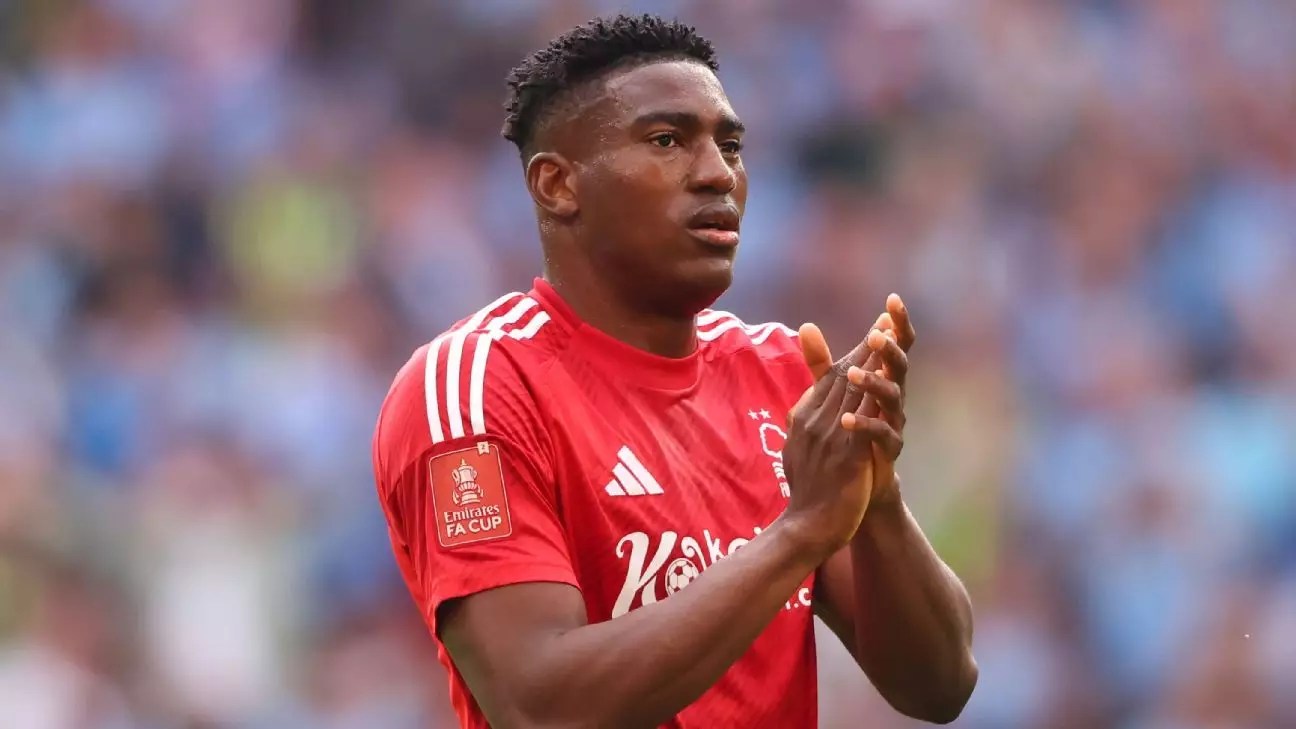In the world of sports, injuries are an unfortunate part of the game. Yet, when they strike an athlete such as Taiwo Awoniyi, who plays a crucial role as a striker for Nottingham Forest, the implications go far beyond the pitch. Awoniyi’s recent abdominal injury, sustained in a crucial match against Leicester City, has raised profound concerns about his health and the psychological impact on both the team and its fanbase.
The Incident: A Moment That Changed Everything
Awoniyi’s collision with the goal frame, an event that could happen in any match, was not just a momentary lapse—it became a pivotal point of discussion, highlighting the more complex realities of athlete health management. After entering the game as a second-half substitute during a challenging 2-2 draw, he found himself in a situation where his well-being turned into a matter of contention, placing a spotlight on the communication dynamics between coaching staff and medical teams.
Amid escalating tensions, Nottingham Forest’s owner, Evangelos Marinakis, expressed clear frustration regarding the handling of the incident. He rushed onto the field in a show of support for Awoniyi, a gesture fueled by instinctive concern. This moment speaks volumes about the bond within sports teams; it underscores how deeply invested owners and coaches are in their players’ health. Yet, it also raises questions about protocols in place for urgent medical assessments during high-stakes moments.
An Induced Coma: The Road to Recovery
Reports indicate that Awoniyi was placed in an induced coma post-surgery, a decision made to facilitate his recovery by minimizing movement and stabilizing his heart rate. While such medical interventions are sometimes necessary, they signify the severity of the situation. The fact that a player can go from participating in a match to being in a coma within days is a stark reminder of the physical risks athletes undertake, often overshadowed by the glamour of professional sports.
As further surgery is planned, the club remains upbeat, asserting that Awoniyi is “recovering well.” However, the psychological ramifications of such a serious injury can linger far longer than physical recovery. The uncertainty about one’s health, career longevity, and impacts on a season that holds Champions League aspirations can weigh heavily on any athlete’s mind.
The Repercussions: Implications for Nottingham Forest
The timing of Awoniyi’s injury couldn’t be more precarious for Nottingham Forest, who find themselves battling for survival in the Premier League and chasing a place in the Champions League. With two pivotal games left in the season—against West Ham and Chelsea—the pressure amplifies not only on the players but on the coaching staff to manage these challenging moments effectively.
Even as the club grapples with this injury crisis, the spirit of teamwork and dedication remains paramount. Marinakis’s unfiltered emotional response, while possibly criticized as inappropriate for the sidelines, showcases the depth of commitment that binds the team together. His frustration is not merely a reflection of frustration at the situation but rather a manifestation of care, a quality that can foster solidarity during tumultuous times.
As the team strives to push forward, they must now do so with a heavy heart. There’s an inherent responsibility to not only perform on the field but also to come together as a community, ensuring that players like Awoniyi are supported throughout their recovery journey.
Looking Ahead: Preserving Athlete Welfare
Awoniyi’s incident has opened a larger conversation about athlete welfare, the responsibilities of clubs, and the support systems in place for players. It serves as a crucial reminder that beyond building strategies for success on the field, clubs must prioritize the health and safety of their players. Perhaps this moment serves as a catalyst for clubs not just in the Premier League but globally, prompting a reevaluation of how they manage injury crises and enforce protocols during tournaments.
While the journey ahead for Awoniyi is still shrouded in uncertainty, the response from Nottingham Forest illustrates a heartfelt commitment that cannot be overlooked. It is this sense of community, partnered with a focus on comprehensive care, that may one day allow athletes like Awoniyi not only to recover but to return to the pitch stronger than ever.


Leave a Reply